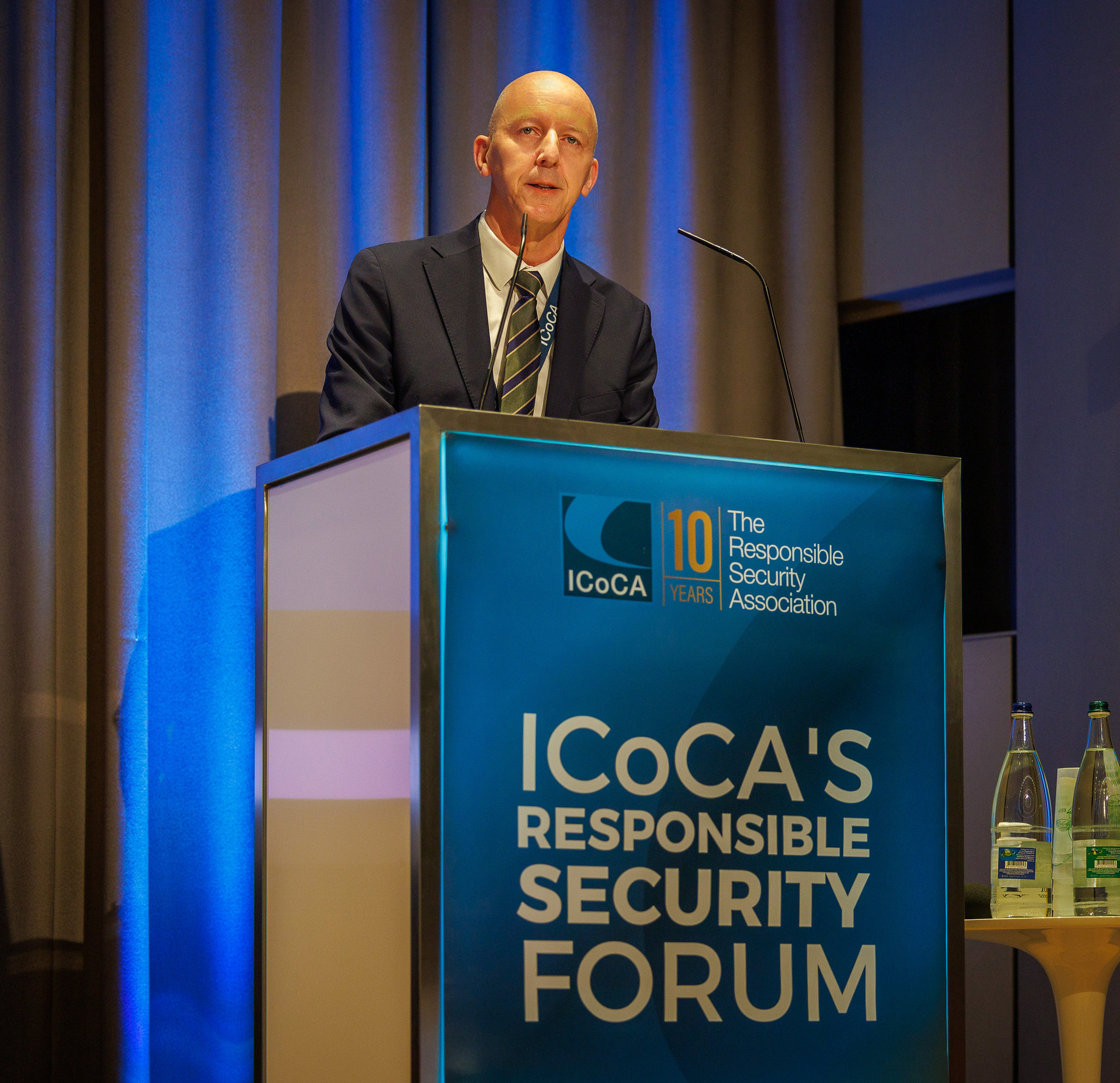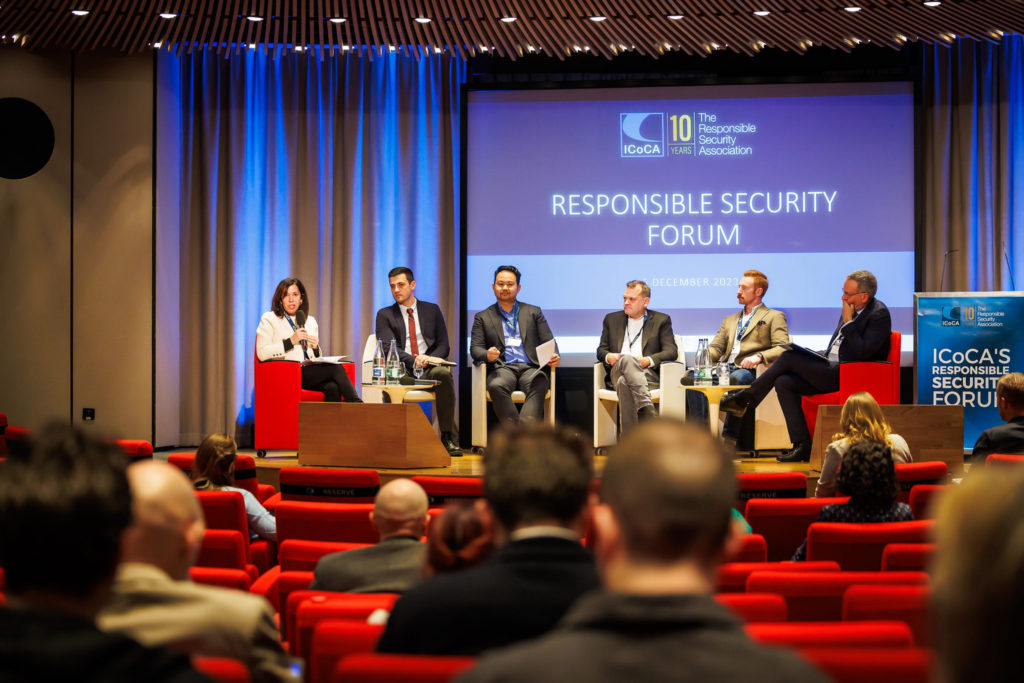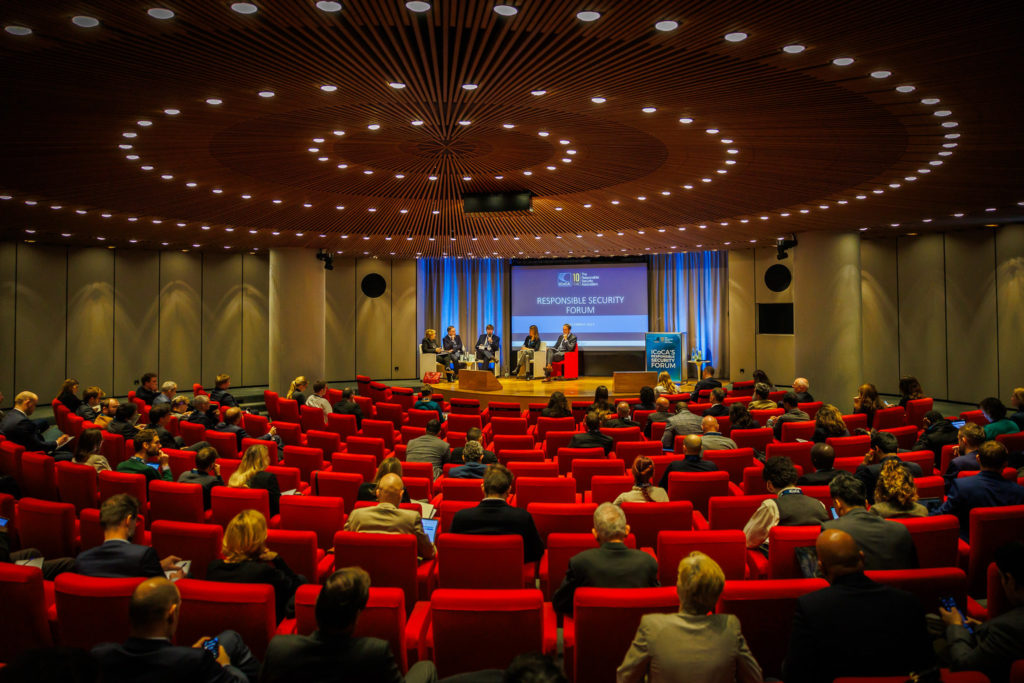EXPERTS CONVENE FOR INAUGURAL RESPONSIBLE SECURITY FORUM
Following the 10th Annual General Assembly (more details here), ICoCA organised the first-ever Responsible Security Forum on 6 December 2023, in Geneva, Switzerland. This inaugural annual event on private security brought together security practitioners, experts and researchers to assess the evolving security landscape and explore innovative solutions.

Ambassador Julien Thöni, Deputy Permanent Representative at the Permanent Mission of Switzerland to the United Nations Office, formally opened the event. Celebrating the 10th anniversary of ICoCA, Mr. Thöni underscored the Association’s growth into a trusted partner for governments, the private sector and civil society, promoting sustainable and responsible business conduct in the security sector. In his remarks, the Ambassador spoke about the increasing demand for private security services in the face of rising international conflicts, technological advancements and societal changes. He emphasised the critical role of certified security providers in upholding human rights standards. Stressing the importance for governments, civil society organisations and private businesses to collaborate with ICoCA certified companies, Mr. Thöni concluded his remarks by recognising the competitive advantages the certification offers.
The five panel discussions at this inaugural Responsible Security Forum tackled a range of critical and contemporary challenges within the private security sector. A range of experts and practitioners addressed a variety of fascinating issues, related to: inclusive practices in the TV sector; ensuring a just energy transition; humanitarian engagement with private security companies; the impact of Wagner on the future of security; and the issue of corruption and weak governance in the security sector.
Inclusive Security Practices: Lessons and Insights from the TV Industry
The Forum kicked off with a breakfast panel hosted in partnership with the TV Industry Human Rights Forum. The TV Industry Human Rights Forum has identified security practices as an important area of human rights risk for the TV industry that is currently under-addressed. The panellists noted that all genres of TV productions rely on security and that it should as such be central to preparation and planning for any project. It was felt however that security is too often an afterthought, a tick in a box for insurance purposes, or a budget line to be cut. The role of diversity and how inclusive security practices can and should be embedded into everyday business operations was another important issue discussed during this first panel.
The Wagner Effect: What Next for Responsible Security?
Over the past twelve months, the Wagner Group has dominated headlines with operations in Ukraine, the Middle East and Africa. Its activities have sparked urgent calls for a deeper understanding of the evolving private military contracting (PMC) landscape, as well as the impact of so-called malign private military contractors (PMCs) and non-responsible security contractors in fragile or unstable environments. Taking as a reference these worrying dynamics, the second panel, organised in partnership with UK FCDO, assessed the market drivers and funding models of PMCs, including state capture or natural resource concessions. It examined their modes of action, ranging from armed violence to disinformation, and considered the necessary actions the international community should take to rein in malign actors, strengthen oversight and enhance accountability of PMCs before it is too late. The fascinating discussion also highlighted the responsibility of private security companies (PSCs) to step up to ensure they are not unfairly tarred with the same brush as the Wagner Group.
Private Security, Corruption and the Case for Transparency and Regulation
The third panel of the day examined where corruption risks lie in the operations of PSCs and how these could be addressed through increased transparency and better regulation of the sector. The discussion highlighted that in many countries the regulatory oversight of the private security sector is failing to keep pace with the rapidly growing and diversifying industry, leading to heightened global risks of fraud, corruption and violence. The panellists noted that many PSCs operate in countries with weak governance, often coupled with feeble defence sector institutions and a culture of secrecy around national security issues, all of which provide a fertile environment for corruption to thrive. Negative impacts can be multifaceted, ranging from exerting undue influence on military and security policy to trafficking arms or minerals. Suggestions arising from the conversation included the proposal for PSCs to combat corruption by establishing rules within their own organisations. The panellists further endorsed the idea of collective action to uphold shared standards, aiming to enhance industry practices and ensure the effective enforcement of these rules.
Uncharted territory: Humanitarian Engagement with PSCs

The fourth panel delved into the often under-explored facet of the rise of PSCs and their impact on humanitarian action and the delivery of humanitarian aid. The panellists identified three main impacts. First, PSCs may directly affect the humanitarian situation of populations in crisis zones: they control checkpoints and populated areas, they can contribute to violence or handle people in vulnerable situations such as migrants and refugees. Second, humanitarian organisations are now widely contracting private security actors to secure their staff, assets and operations. This recent evolution may not only blur the perception of humanitarian organisations as neutral actors but also create risks for the people they assist, when poorly vetted or trained security contractors abuse their power. Finally, in some contexts, humanitarian actors need to negotiate with PSCs for acceptance and access. Engaging with PSCs is new territory for many aid workers: this panel started to unpack this new area of humanitarian aid and negotiation. The discussion highlighted that a robust and honest engagement between security providers and humanitarian agencies in the field is necessary. This will help to create an improved understanding of how to ensure protection of civilians affected by armed conflicts, without compromising on humanitarian principles and responsible security practices. The panellists suggested that these conversations happen through official channels, provided by some NGO platforms for example.
Securing the Just Transition: The Pivotal Role of Private Security
The final panel was organised in partnership with the OECD and the Investor Alliance for Human Rights. It considered how actors all along the value chain, from investors to the users of private security and the service providers themselves, play critical roles in ensuring responsible security that contributes to peace, security and wellbeing. Without it, a truly just transition will remain out of reach. The path to a low-carbon economy will require massive investment in the extractive, commodities and infrastructure sectors, with many minerals sourced in fragile contexts. As this captivating discussion highlighted, private security providers are often caught in the middle between companies and the surrounding communities, in a race for resources that all too often ignites or exacerbates conflict, and they need to interact with local communities in a responsible way. The responsibility of all companies to carry out due diligence on their supply chain to identify risks, such as direct or indirect support of conflicts or financing serious abuses to human rights, was highly emphasised in this panel.
This first Responsible Security Forum provided a rich and insightful exploration of critical issues within the private security industry. As we reflect on the diverse challenges highlighted at the event, it becomes evident that collaborative efforts are essential for achieving responsible security practices. The need for increased transparency, better regulation and stronger oversight in the private security sector cannot be overstated. The insights shared underscore the importance of ongoing dialogue and cooperation between governments, civil society, private businesses and security practitioners. This forum has laid a foundation for future discussions, research and actions that will contribute to fostering a responsible and sustainable security environment.
We express our sincere appreciation to all participants and partners for their contributions to this significant event, and hope to see you for the next edition!

View more photos from the event on this link.
